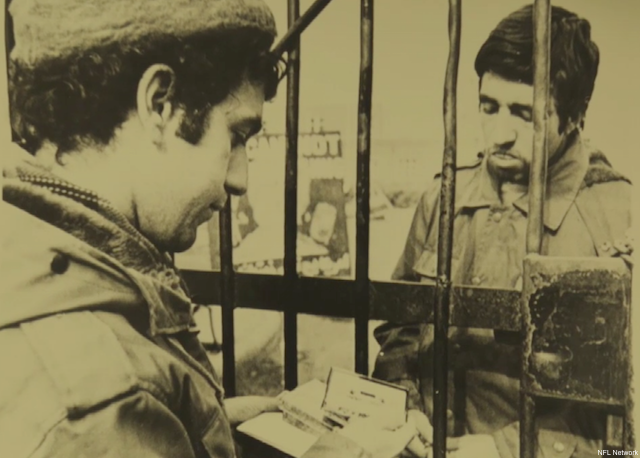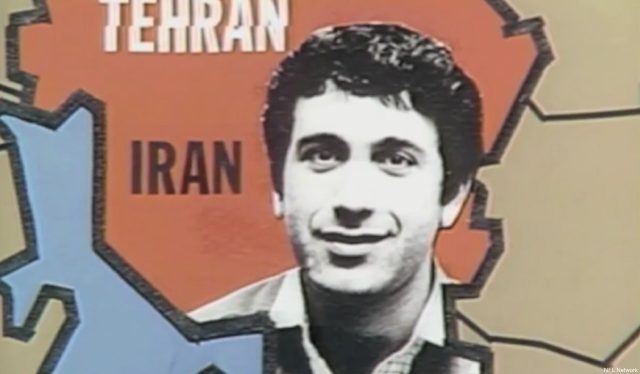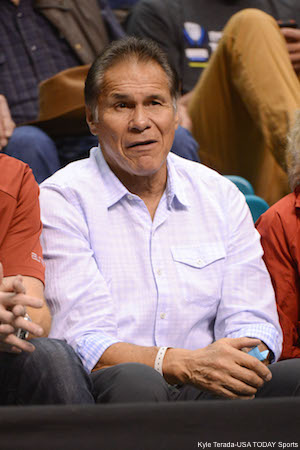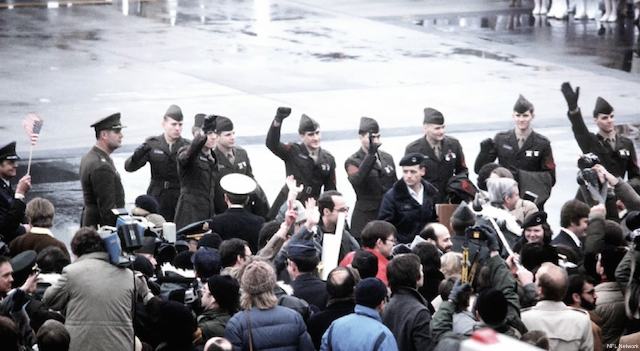Alex Paen showed up at the U.S. Embassy gates in Tehran on the morning of Jan. 21, 1980. The Iranian guards, who called him, "Radio California," had been expecting him after arrangements were made several days earlier.
Paen put the tapes in his main contact's hand, but he didn't let go.
"Are you going to play this for the hostages?" he asked.
"Of course," the guard answered. "Did the announcers say this game was being taped and going to be played for the hostages?"
"Yes."
"It better be, because if they don't, we won't play it for the hostages."
"Yes, but are you going to play it for the hostages?"

Paen chuckles about it now, thinking about the actions of his 26-year-old self on that day. He was an ambitious reporter for KMPC Radio in Los Angeles. After convincing his employer to send him to Tehran during the 1979 Iran Hostage Crisis, Paen developed a rapport with the young guards, bonding over age and sporting interest.
When Iran notified American journalists they would be expelled in January 1980, Paen developed a plan to delay his departure from the country. His cunning is documented in the upcoming film, America's Game and the Iran Hostage Crisis, airing Saturday on NFL Network after the Redskins-Eagles game. Part of NFL Network's The Timeline series, the documentary is narrated by George Clooney and directed by Tate Donovan.
"I knew the Super Bowl was coming up," Paen remembers. "I knew in my conversations with the militants, we had talked about football a lot from their American days. They talked about the NFL. I knew the Americans inside talked about missing football because during Christmas time. Clergymen went in and said they talked about sports."
Hanging around the gates, Paen learned many of the Iranian guards went to school in the United States and developed an affinity for the NFL. His connections popularized his name in the United States, as he interviewed militants in the compound while blind-folded, communicated with a hostage, Jerry Plotkin, via phone and delivered roughly 4 million Christmas cards and letters to the hostages.

Paen's Super Bowl endeavors represent one of the most pragmatic tales of the Iran Hostage Crisis. In exchange for tapes of Super Bowl XIV -- featuring the Los Angeles Rams and Pittsburgh Steelers on KMPC -- Paen could report the crisis back to America through game day. However, the Iranians required KMPC to make news of the deal public during the broadcast.
"They wanted the PR value out of it to show the world they were humane and generous," Paen says.
Paen handed off the tapes. A few days later he traveled back to the United States. He returned to Tehran for a stint in April and May and made at third trip a year after the crisis ended. Although Paen has covered such events as the Gulf War, the Pope John Paul II shooting and the civil war in El Salvador, he has not returned to Iran in over three decades.
America's Game and the Iran Hostage Crisis visits Paen's Super Bowl deal from inside the U.S. Embassy. Although Paen did not meet the hostages face to face until the crisis ended, they knew of him and his efforts. The tape made its way to a room occupied by two civilians and two marines.

Rocky Sickmann was one of those Marines. He wrote in his diary about hearing the announcers mention the hostages. "It's really a great feeling knowing we're not forgotten over here," he wrote.
Hostages flooded the cramped room to hear Terry Bradshaw's Steelers win, 31-19.
"It wasn't about me delivering the Super Bowl," Paen says. "It was about the Super Bowl being heard by the captive Americans. I don't know if all of them listened to it, but I know several hostages listened to it. It gave them hope that Americans didn't forget them. It gave them a moment of joy that they could reconnect with their memories of watching the Super Bowl with family over the years."
The documentary's interview cast features a wide array of hostages (marines and civilians), family members of hostages, journalists, an Iranian student, politicians (including Walter Mondale), NFL players (including John Stallworth, Herman Edwards, Jim Plunkett) and coaches (including Dick Vermeil).
"In a time America seemed to be divided between left and right, it's a story where the whole nation came together," Donovan, who played U.S. consular agent Bob Anders in Argo, says. "It didn't matter your politics. Both President Carter and incoming President Reagan got together and worked it out."

While Paen's Super Bowl exchange is at the forefront of the film, other football angles are included. Ross Perot, Tom Landry and the Dallas Cowboys considered an Argo-like tape message. The only newspaper hostages had access to was The Sporting News, which updated them on their NFL teams and actually revealed the death of the Shah.
The NFL angle comes full circle when the hostages were released on Jan. 20, 1981, the day of Reagan's inauguration. After a stop at Rhein-Main Air Base in West Germany, where Paen met the hostages, the group settled in the U.S. at the Thayer Hotel at West Point. It was there that many of the hostages reintegrated into American society by watching Super Bowl XV on Jan. 25.
"It's kind of like the great American campfire," Donovan says of the Super Bowl.
Plunkett led the Raiders to a 27-10 win in the Louisiana Superdome, which was decked out in a giant yellow ribbon. One of the hostages, Don Holman, proceeded to dial the operator and get connected with Plunkett, the Super Bowl MVP, in the Raiders' locker room.
Although not part of the original intention, Saturday's film will be unveiled in the midst of one of the more fear-mongering periods in the last decade of American politics. ISIS is a constant fear of Westerners, and terrorism is a main topic of the 2016 presidential election cycle.
"I was in a cab ride home with the producer, and the cab driver asked, 'What are you doing at the NFL?'" Donovan says. "I said, 'We're going to make this movie about the Iran Hostage Crisis and the Super Bowl, its link.' He remembered the Super Bowl–he was a Philly fan and the Eagles lost. He was frustrated about that and then he was like, 'We should have bombed them. We should have just carpet-bombed Iran.' I was like, 'How do you think those 52 hostages and their families would have felt? They would have passed away too.' It's sort of this knee-jerk reaction."

Paen and Donovan both say they hope Americans note the diplomacy from both sides of the Iran Hostage Crisis, that eventually led to all 52 hostages making it home in one piece.
Even on the Iranian end, the film is unlikely to draw animosity.
"I think the story is about human beings sharing a moment about a sporting event," Paen, now president of Telco Productions, Inc., says. "It's a sort of positive. I don't think there's going to be any bad reaction because even though they held Americans captive, it was about listening to a major sporting event, the Super Bowl. Now, that it's the 50th anniversary of the Super Bowl, it's an international event. I think they'll look back and interpret it as they were nice enough to let Americans listen to it."
The film is produced by Smoke House Pictures, Clooney's production company. After airing on Saturday, the film will re-air on NFL Network in January.
Smoke House Pictures also produced Argo, which won an Academy Award for Best Picture of 2012.
-- Follow Jeffrey Eisenband on Twitter @JeffEisenband.





